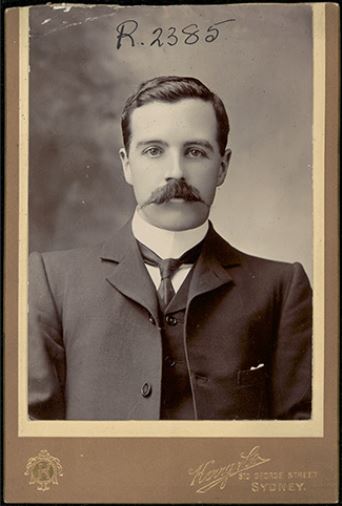Maj.
Gother Robert Carlisle Clarke
Informationen zu Geburt
|
Geburtsdatum: 27/04/1875 |
|
Geburtsort: Willoughby, North Sydney, New South Wales, Australia |
Allgemeine Informationen
|
Beruf: Artz |
Informationen zum Armeedienst
|
Land: Australia |
|
Truppe: Australian Imperial Force |
|
Rang: Major |
|
Dienstnummer: / |
|
Einberufung datum: 14/03/1916 |
|
Einberufung ort: Sydney, New South Wales, Australia |
|
Einheiten: — Australian Infantry, 34th Bn. (Letzte bekannte Einheit) |
Informationen zu Tod
|
Sterbedatum: 12/10/1917 |
|
Sterbeort: Haalen, Passchendaele, Belgien |
|
Todesursache: Im Kampf gefallen |
|
Alter: 42 |
Begräbnisplatz
|
Buttes New British Cemetery, Polygon Wood Grabstelle: III Reihe: A Grab: 5 |
Auszeichnungen und Orden 2
|
British War Medal Medaille |
|
Victory Medal Medaille |
Punkte von Interesse 3
| #1 | Geburtsort | ||
| #2 | Einberufung ort | ||
| #3 | Ort des Todes (ungefähr) |
Meine Geschichte
Major Gother Robert Carlisle Clarke, a doctor by trade, served in the Australian Infantry 34th Battalion, part of the 9th Brigade, of the 3rd Division.
On the 12th of October 1917 the 3rd Division participated in the First Battle of Passchendaele. The Division advanced with two brigades, the 9th and 10th. The attack of the 9th Brigade was carried by the 34th and 35th Battalion and had two main objectives. They would first secure the area until after Augustus Wood and then they would try and capture Passchendaele village.
At 5.25 am the 34th Battalion started to advance in total confusion due to the heavy German shelling of the jumping-off lines. The advance was even more complicated due to the mud that slowed the soldiers down. Not soon after, the 35th Battalion joined the attack. Together they moved on towards the first objective. On their way, the 35th Battalion was able to overrun Defy Crossing, Hillside Farm and Augustus Wood.
When they had consolidated the first objective, they moved along the Passchendaele road towards the village itself, in front of which lay their second objective. Once they arrived at the ruins of the village, they encountered only slight resistance.
Several patrols managed to enter Passchendaele, but they were soon forced to retreat, due to renewed German resistance. At around 3 pm, both Battalions were pushed back past Augustus Wood and they eventually ended up close to where they had initially started.
Major Gother Robert Carlisle Clarke was killed in action on the 12th of October 1917, in the vicinity of the hamlet of Haalen, just west of Passchendaele. Several witnesses in his Red Cross Wounded and Missing File state that Major Clarke was hit by a shell as he was dressing the wounds of another man near a pillbox. His remains were exhumed after the war and buried in Buttes New British Cemetery, Polygon Wood.
On the 12th of October 1917 the 3rd Division participated in the First Battle of Passchendaele. The Division advanced with two brigades, the 9th and 10th. The attack of the 9th Brigade was carried by the 34th and 35th Battalion and had two main objectives. They would first secure the area until after Augustus Wood and then they would try and capture Passchendaele village.
At 5.25 am the 34th Battalion started to advance in total confusion due to the heavy German shelling of the jumping-off lines. The advance was even more complicated due to the mud that slowed the soldiers down. Not soon after, the 35th Battalion joined the attack. Together they moved on towards the first objective. On their way, the 35th Battalion was able to overrun Defy Crossing, Hillside Farm and Augustus Wood.
When they had consolidated the first objective, they moved along the Passchendaele road towards the village itself, in front of which lay their second objective. Once they arrived at the ruins of the village, they encountered only slight resistance.
Several patrols managed to enter Passchendaele, but they were soon forced to retreat, due to renewed German resistance. At around 3 pm, both Battalions were pushed back past Augustus Wood and they eventually ended up close to where they had initially started.
Major Gother Robert Carlisle Clarke was killed in action on the 12th of October 1917, in the vicinity of the hamlet of Haalen, just west of Passchendaele. Several witnesses in his Red Cross Wounded and Missing File state that Major Clarke was hit by a shell as he was dressing the wounds of another man near a pillbox. His remains were exhumed after the war and buried in Buttes New British Cemetery, Polygon Wood.
Quellen 5
|
34 th Australian Infantry Battalion, (Australian War Memorial, Campbell (AWM), AWM4 23/51/12). https://www.awm.gov.au/collection/C1338583 Verwendete Quellen |
|
Australian War Memorial https://www.awm.gov.au/collection/P10315966 Verwendete Quellen |
|
Beaver E. and Meldrum J.W.G., . A Short History of the 34th Battalion, AIF, (Carlton, Illawarra Press, 1957), pg. 22-24. Verwendete Quellen |
|
First Australian Imperial Force Personnel Dossiers, 1914-1920, (National Archives of Australia, Canberra (NAA), B2455, CLARKE G R C). https://recordsearch.naa.gov.au/SearchNRetrieve/Interface/SearchScreens/NameSearch.aspx. Verwendete Quellen |
|
McCarthy C., The Third Ypres Passchendaele. The Day-by-Day Account, (London, Arms & Armour Press, 1995), pg. 113-115. Verwendete Quellen |
Weitere Informationen 4
|
Commonwealth War Graves Commission Database https://www.cwgc.org/find-records/find-war-dead/casualty-details/480159 |
|
Namenlijst (In Flanders Fields Museum) https://namenlijst.org/publicsearch/#/person/_id=d307feb4-df4b-49b7-9d3e-ae0c680869f3 |
|
Lives of the First World War (Imperial War Museum) https://livesofthefirstworldwar.iwm.org.uk/lifestory/7319779 |
|
The AIF Project (UNSW Canberra) https://aif.adfa.edu.au/showPerson?pid=54180 |
